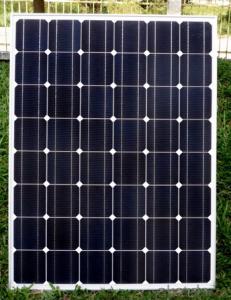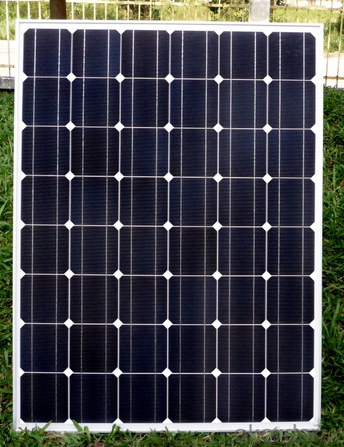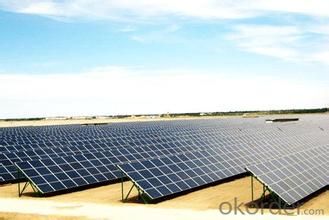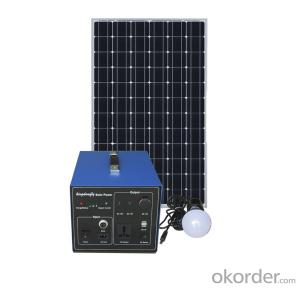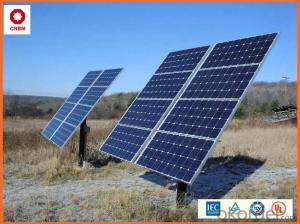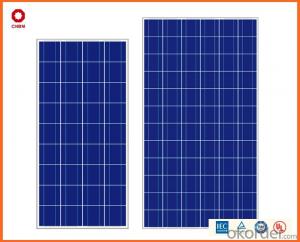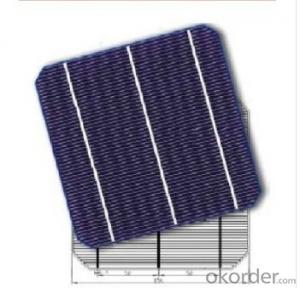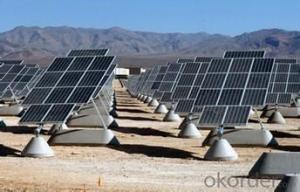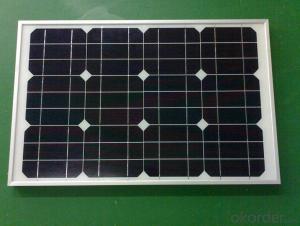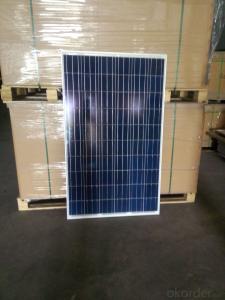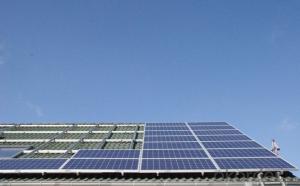25kW Solar Energy Systems for Boats with 25 Years Quality Assurance
- Loading Port:
- Shanghai
- Payment Terms:
- TT OR LC
- Min Order Qty:
- 1 pc
- Supply Capability:
- 100 pc/month
OKorder Service Pledge
OKorder Financial Service
You Might Also Like
Specification
25KW Solar Home Solution with 25 years Qualtiy Assurance
Production description
PV systems range from small, rooftop-mounted orbuilding-integrated systems with capacities from a few to several tens of kilowatts, to large utility-scale power stations of hundreds of megawatts. Nowadays, most PV systems are grid-connected, while off-grid or stand-alone systems only account for a small portion of the market.
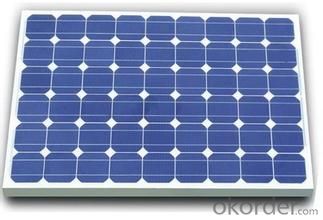
Feature
1.High conversion efficiencies resulting in superior power output performance.
2.Outstanding power output even in low light or high temperature conditions
3.Optimized design for ease of soldering and lamination
4.Long-term stability,reliability and performance
5.Low breakage rate
6.Color uniformaity
Physical characteristic
1. Rigorous quality control meets the highest international standards.
2. High-transmissivity low-iron tempered glass, strong aluminium frame.
3. Using UV-resistant silicon.
4. IS09001/14001/CE/TUV/UL
- Q: Can solar energy systems be used in areas with limited access to solar energy community initiatives?
- Yes, solar energy systems can still be used in areas with limited access to solar energy community initiatives. While it may be more challenging to implement large-scale solar projects in areas with limited solar resources, individual households or businesses can still benefit from smaller solar energy systems, such as rooftop solar panels. These systems can help generate electricity locally, reducing reliance on traditional energy sources and contributing to a more sustainable energy future. Additionally, advancements in solar technology, such as more efficient panels and energy storage solutions, can further improve the viability of solar energy systems in areas with limited access to solar energy community initiatives.
- Q: How does solar energy compare to other renewable energy sources?
- Solar energy is a highly efficient and versatile renewable energy source that has numerous advantages over other renewable energy sources. Firstly, solar energy is abundant and widely available, as it is derived from the sun, which is an inexhaustible source of energy. This makes solar energy more reliable and sustainable compared to other renewable sources like wind or hydroelectric power, which are dependent on specific weather conditions or geographical features. Additionally, solar energy is a decentralized energy source, meaning it can be generated and utilized at the point of consumption. This reduces the need for extensive transmission infrastructure, which is often required for other renewable energy sources like geothermal or tidal energy. Solar panels can be installed on rooftops or in open spaces, enabling individuals and businesses to generate their own electricity and reduce their dependence on the grid. In terms of environmental impact, solar energy is considered one of the cleanest energy sources available. Unlike fossil fuels, solar energy does not produce harmful emissions or contribute to air pollution. It also requires minimal water usage compared to other renewable sources like hydroelectric power, which can be particularly important in areas with water scarcity. By harnessing the power of the sun, solar energy helps combat climate change and reduces our reliance on finite resources. Furthermore, solar energy has become increasingly cost-effective in recent years, with the cost of solar panels and installations declining significantly. This has made solar energy more accessible to a wider range of individuals and businesses, leading to a rapid growth in the solar industry. In comparison, other renewable energy sources may still require more investment and have higher operational costs. While solar energy has many advantages, it is important to note that it also has some limitations. It is intermittent, meaning it is only available during daylight hours and can be affected by weather conditions. However, advancements in energy storage technologies, such as batteries, are addressing this limitation by allowing solar energy to be stored for use during non-sunlight hours. In conclusion, solar energy stands out among other renewable energy sources due to its abundance, reliability, decentralization, environmental benefits, and decreasing costs. As we strive to transition to a more sustainable energy future, solar energy plays a crucial role in meeting our energy needs while minimizing our impact on the environment.
- Q: Can solar energy systems be used in powering street lights?
- Yes, solar energy systems can be used in powering street lights. Solar panels can be installed on street light poles or nearby rooftops to capture sunlight and convert it into electricity. This clean and renewable energy source can then be used to power the street lights, reducing the dependence on traditional grid electricity and lowering overall energy costs. Solar-powered street lights are increasingly being adopted globally as an environmentally friendly and sustainable lighting solution.
- Q: Can solar energy systems be used in areas with high levels of natural disasters?
- Yes, solar energy systems can be used in areas with high levels of natural disasters. Solar panels are designed to withstand various weather conditions, including hurricanes, earthquakes, and extreme temperatures. Additionally, solar energy systems are decentralized and can operate independently of the grid, providing a reliable source of electricity during power outages caused by natural disasters. Therefore, solar energy systems can be a valuable and resilient solution for generating clean energy in disaster-prone areas.
- Q: Can a solar energy system be connected to the grid?
- Yes, a solar energy system can be connected to the grid. In fact, most solar installations are designed to be grid-connected, allowing excess electricity to be fed back into the grid and reducing reliance on non-renewable energy sources. This connection also enables homeowners and businesses to benefit from net metering programs, where they receive credits or payments for the surplus electricity they generate.
- Q: What is the difference between a solar power purchase agreement (PPA) and a solar lease?
- A solar power purchase agreement (PPA) is a contract between a solar energy provider and a customer, where the customer agrees to purchase the energy generated by the solar panels at a predetermined rate over a fixed period of time. On the other hand, a solar lease allows the customer to lease the solar panels from a provider and pay a fixed monthly amount for the use of the equipment, without necessarily purchasing the energy generated. While a PPA involves buying the energy, a solar lease involves renting the equipment.
- Q: Are solar energy systems noisy?
- No, solar energy systems are not noisy. They operate silently as they convert sunlight into electricity without any moving parts or mechanical components.
- Q: What is the role of charge controllers in solar energy systems?
- The role of charge controllers in solar energy systems is to regulate and control the flow of electricity between the solar panels and the batteries. They ensure that the batteries are charged efficiently and prevent overcharging or damage to the batteries. Additionally, charge controllers help optimize the performance and lifespan of the batteries by providing protection against over-discharging and excessive voltage.
- Q: Can solar energy systems be used in areas with high levels of dust or sand?
- Solar energy systems can still function in dusty or sandy areas, although their efficiency may suffer. Dust or sand can gather on the surface of the panels, limiting the amount of sunlight that reaches the photovoltaic cells. Consequently, the system's energy production may decline. To address this issue, regular cleaning and maintenance of the solar panels are necessary in dusty or sandy regions. This can involve rinsing the panels with water or utilizing automated cleaning systems. Additionally, adjusting the tilt angles of the panels can minimize the accumulation of dust or sand. Moreover, advancements in solar panel technology have led to the creation of self-cleaning panels that repel dust or sand particles. These panels employ hydrophobic coatings or anti-soiling technologies to prevent dust buildup and maintain optimal energy production. In conclusion, although solar energy systems can operate in areas with high levels of dust or sand, it is crucial to implement appropriate maintenance and cleaning practices to ensure maximum efficiency and energy production.
- Q: Can a solar energy system be installed on a metal roof?
- Yes, a solar energy system can be installed on a metal roof. In fact, metal roofs are often considered ideal for solar panel installation due to their durability and ease of installation. The metal roof provides a stable and secure surface for mounting the solar panels, and the sleek design of the panels can complement the aesthetics of the roof. Additionally, metal roofs are typically more resistant to weather elements such as hail, wind, and snow, which can further protect and prolong the lifespan of the solar energy system. With proper installation techniques and mounting hardware, a solar energy system can efficiently and effectively generate renewable energy on a metal roof.
Send your message to us
25kW Solar Energy Systems for Boats with 25 Years Quality Assurance
- Loading Port:
- Shanghai
- Payment Terms:
- TT OR LC
- Min Order Qty:
- 1 pc
- Supply Capability:
- 100 pc/month
OKorder Service Pledge
OKorder Financial Service
Similar products
Hot products
Hot Searches
Related keywords
